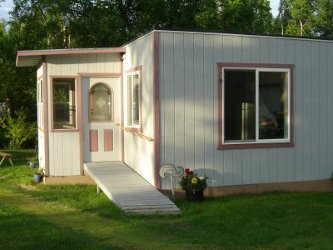Most people who are in the initial phases of a new RTM construction financing home project don’t have the cash on hand to finance the purchase completely, so they need a mortgage to finance the balance. Securing this sort of mortgage is somewhat different from securing a traditional mortgage, and it also helps to work with a lender that is more amenable to issuing RTM mortgages. If you’re just at the starting point with your project, take a look at some of the requirements that most traditional lenders will ask for.
Modular Home Mortgage Loan Requirements
- Funds have to be released by the lender to lawyer in held in trust for the builder before home delivery to the site
- The borrower often has to own the land where the home will be delivered. When there is a lease on the land, the home often depreciates more quickly, which can make it harder for a lender to get its money back in the event of default and foreclosure.
- The mortgage loan compared to the land value (LTV) has be satisfactory so that refinance transition efforts to a new lender upon completion is a non-issue
- The home has to connect to a foundation – and many lenders want a permanent foundation with a cement footing, rather than wooden blocks.
- The borrower will need to secure homeowner’s insurance
- The borrower needs a purchase of sale or contract in which the builder has indicated all of the terms, including the obligations for both parties
- RTM homeowners must have a building permit indicating that the project follows national, provincial and municipal codes, when applicable
- Some lenders also require a water test
- Age of the property is a significant concern. Our lenders prefer new build RTM, but exceptions can be made. The lenders will check into the Remaining Economic Life (REL) of any RTM before financing the purchase. The longest amortization you will generally be able to get is the REL minus five years, so it is much easier to finance newer homes. On a mobile home, the REL is often determined to be 40 years minus the current age, because of the fragility of steel frames.
- The borrower will often need to put at least 20 percent down to avoid having to jump through additional hoops set up by the CMHC. This is true for other residential mortgages as well, but additional hurdles can appear with an RTM mortgage here as well.
- If your credit is fair or even poor, your approval is more likely if you are moving to an area where resale is more likely – where the real estate market is more favorable. With better credit, you have more choices as to the location of the project.
There are also some different terms when it comes to the financial side. Some credit unions will tie the amount of building funds they advance to approval of specific inspections. Mortgage brokers sometimes provide more flexible options and better rates, but they may not be able to meet all of the specifications for RTM projects. For modular home bridge financing and related loans, a credit union is often the best alternative, but there are other private lender options – let us help! Contact us for a an understanding of our easy loan application process.

